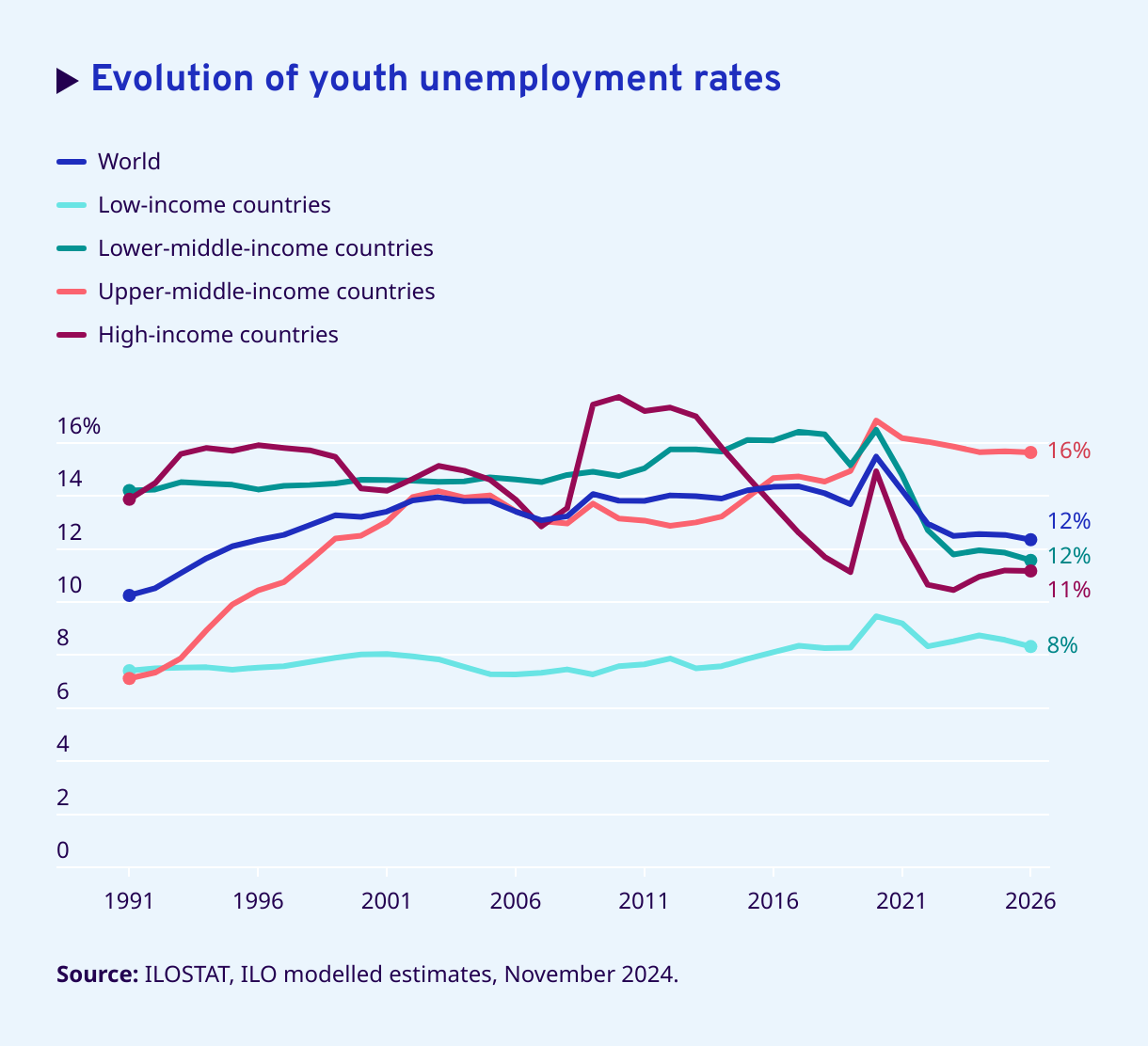Imagine waking up one morning, scrolling through your job alerts, and realising that the listings have thinned out like a fading fog. The old certainties of employment are crumbling before our eyes. As a researcher and consultant in performance psychology and mental health, I've spent years studying the intricate dance between human resilience and systemic change, guiding individuals through high-stakes transitions – from athletes pivoting mid-career to professionals rebuilding after setbacks. I've witnessed firsthand how economic shifts can rattle our sense of security, yet also spark profound growth. The traditional career ladder isn't just missing a few rungs – the entire structure is being rebuilt whilst we're all still climbing it.
The traditional career ladder isn't just missing a few rungs – the entire structure is being rebuilt whilst we're all still climbing it.
In this piece, I'll unpack the Jobpocalypse with a blend of hard data, real-world stories, and practical wisdom drawn from my expertise. We'll explore plummeting job openings, soaring unemployment, the headaches plaguing recruiters, and AI's double-edged sword in reshaping everything. But this isn't just doom-scrolling material; it's a roadmap to resilience. Drawing on performance psychology principles – like cultivating a growth mindset or mastering adaptability – I'll show how you can thrive amid the chaos. These aren't just statistics – they're human stories of dreams deferred, talents untapped, and potential unrealised.
Why listen to me? Because in my work, I've helped countless people turn uncertainty into opportunity. And soon, I'll be launching a comprehensive course on performance psychology, designed for athletes, coaches, students, researchers, and beyond. These resources aim to equip you with tools to excel, whether in sports, business, or life. If you're serious about future-proofing your career, consider joining my membership community – it's where I share exclusive strategies to boost your mental agility and wellbeing.
Buckle up; the future of work isn't coming – it's here. And with the right mindset, it's not a catastrophe, but a call to reinvent.
The Jobpocalypse Unfolded
As I write this, the data paints a stark picture. Job openings are plummeting, and it's not just a blip.
According to United Nations, the global economy is slowing down, which is making it increasingly difficult for labor markets to recover fully. International Labour Organization (ILO) reports that the global unemployment rate remained steady at 5 per cent in 2024, its lowest since 1991, and is expected to hold near that level in 2025. However, this masks deeper issues, with strong headline indicators hiding persistent structural weaknesses. The ILO highlights that global labour productivity growth has fallen by half a percentage point from the pre-pandemic long-term average.
According to ILO, the jobs gap – those wanting work but without it – remains significant, with rates in 2023 at 8.2 per cent in high-income countries versus 21.5 per cent in low-income ones. Developing countries face additional challenges due to rising debt levels, which narrow the scope for policy interventions. It has been reported that low-income developing countries in debt distress have a significantly higher jobs gap, reaching 25.7% in 2023, compared to 11% in developing countries at low risk of debt distress.
Youth unemployment is particularly stark, at 12.6 per cent globally, with little improvement. Young men face 12.4 per cent, and young women 12.3 per cent. In upper-middle-income countries, youth unemployment hits 16 per cent, while low-income nations show 8 per cent, often masking underemployment.

The number of people classified as NEET (Not in Employment, Education, or Training) remains high, especially among young women, with global estimates for 2025 at 262 million young people – one in four – neither working nor studying, according to ILO. Furthermore, those re-entering the labour market post-pandemic work fewer hours, and sick days have surged.
But here's what troubles me most: this isn't just economics.
The psychological toll of prolonged joblessness creates ripple effects that extend far beyond bank accounts. Research consistently shows unemployment increases depression, anxiety, and feelings of worthlessness. When an entire generation of graduates faces these challenges, we're looking at a mental health crisis disguised as an employment crisis. Young professionals today experience what I call "achievement whiplash" – they've followed all the rules (degrees, internships) only to compete for fewer opportunities. The graduate crisis reveals an uncomfortable truth: we've created an economy dependent on experienced workers whilst reducing pathways to gain that experience. It's a catch-22 that would be comedic if it weren't so devastating.
Young professionals today experience what I call "achievement whiplash" – they've followed all the rules (degrees, internships) only to compete for fewer opportunities.
From a performance psychology lens, this erodes confidence and rewires perceptions of work. Graduates grapple with imposter syndrome amplified by rejection, leading to diminished wellbeing. Yet, crises forge resilience. As I often share, building mental flexibility – adapting without breaking – is key for flourishing. For more, see my insights on performance psychology.
In essence, the Jobpocalypse exposes system vulnerabilities but highlights the human edge: empathy, creativity, endurance. Ignore it at your peril; embrace it, and emerge stronger.
AI: The Great Disruptor
Ah, AI – the elephant in the boardroom, or perhaps the robot at the desk. It's not just hype; it's reshaping work with surgical precision. Goldman Sachs estimates that generative AI could expose the equivalent of 300 million full-time jobs to automation globally. The World Economic Forum's Future of Jobs Report 2025 reveals that 41 per cent of companies worldwide plan to reduce their workforce by 2030 as AI automates tasks. Yet, it's not all loss: the report projects 170 million new jobs created this decade. It has been estimated that 14 per cent of employees globally may need to change careers by 2030 due to AI.
Take law firms, for instance. Traditionally labour-intensive, they're now all-in on AI. In a survey conducted by Reuters with legal professionals, it was revealed that 80% of respondents anticipate a significant or transformative impact of AI on their work within the next five years. Among legal professionals currently utilising AI tools, a substantial proportion employ these tools for various tasks: 77% use AI for document review, 74% for legal research, and another 74% to summarise documents. Additionally, 59% of respondents reported using AI to draft briefs or memos. These findings underscore the growing adoption and perceived importance of AI within the legal profession, as it continues to shape the way professionals approach various aspects of their work.
The psychological implications are staggering. I've worked with professionals feeling "professionally obsolete" in their prime. The challenge isn't just skills – it's resilience as expertise commoditises. This shifts professional identity.
Yet, AI's impact isn't uniformly destructive. Bloomberg reports that global banks expect to replace 200,000 roles in three to five years. But 70 per cent of CEOs believe generative AI will significantly transform businesses, often creating new positions. Entry-level hiring has dropped sharply; in European tech, by 73 per cent since 2024. Philosophically, it's a reminder: progress isn't linear; it's a wave drowning the unprepared.
From my vantage in performance psychology, AI demands mental agility. Adaptability is the new currency. In consultations, those viewing AI as collaborator show better resilience. It amplifies human strengths like strategic thinking and emotional intelligence, core to relationships and wellbeing.
AI isn't the villain; it's the catalyst. Will you let it disrupt you, or direct it?
Recruiters in Crisis and the Rise of Prompting
Recruiters, those unsung heroes, face an impossible puzzle: matching human potential with algorithmic precision in a landscape where skills become obsolete overnight. Talent shortages persist in high-skill areas, yet mismatches abound – square pegs in round holes. The ILO notes job vacancies dipping below trends, signalling cooling. AI-driven hiring adds pressure: platforms automate sourcing, screening, and interviews, creating barriers where candidates optimise for algorithms first.
But here's where the future gets interesting: prompting has emerged as the most crucial skill for navigating an AI-dominated workplace. Effective prompt engineering – the ability to communicate clearly and strategically with AI systems – has become as fundamental as literacy itself. Companies now prioritise candidates who can manipulate AI outputs through clean, structured instructions. This isn't just about writing better queries; it's about understanding how to collaborate with artificial intelligence to amplify human capabilities.
From a performance psychology perspective, prompt engineering represents a fascinating cognitive shift. It requires what I call "collaborative thinking" – the ability to break down complex problems into components that both humans and machines can process effectively. Those who master this skill don't just survive the AI transition; they thrive within it. The best prompt engineers combine analytical precision with creative problem-solving, making them invaluable in an automated world.
The recruitment transformation reflects broader truth: success depends on directing AI, not competing with it. This psychological pivot – from seeing AI as competition to viewing it as a powerful tool – often determines who adapts successfully to the new economy.
Join a thriving community of high performers. Receive the latest insights, articles, and tips delivered directly to your inbox!
Navigating the New Economy
The economy we're entering isn't just different – it's fundamentally restructured around human-AI collaboration. Companies are creating what researchers call "diamond-shaped" organisational structures: senior leadership at the top, a substantial middle management layer, but dramatically fewer entry-level positions. This isn't sustainable long-term, but it's our current reality.
Performance psychology offers crucial insights for thriving in this environment. The individuals I work with who successfully navigate career transitions share several key characteristics: they maintain what I call "adaptive optimism" – a realistic assessment of challenges combined with confidence in their ability to develop new competencies. They focus on building transferable psychological skills rather than defending outdated ones.
Mental resilience becomes paramount when traditional career progression routes disappear. I've observed that professionals who maintain strong psychological wellbeing during periods of uncertainty typically employ three strategies:
- they reframe change as opportunity rather than threat,
- they invest heavily in continuous learning, and
- they build diverse professional networks that extend beyond their immediate industry.
The concept of career grit "anti-fragility" – becoming stronger through challenge rather than merely surviving it – has never been more relevant. This means actively seeking roles and projects that expose you to AI tools, even if initially uncomfortable. The psychological research is clear: controlled exposure to challenging technologies builds competence and confidence simultaneously.
For those feeling overwhelmed by the pace of change, remember that adaptability is trainable. In my work, I often help individuals develop what I term "change fluency" – the psychological toolkit needed to navigate continuous transformation without losing your centre. This includes stress management techniques, growth mindset cultivation, and the ability to maintain personal identity whilst professional roles shift around you.
Building Resilience: Practical Tips for Job Seekers
In the thick of uncertainty, what separates those who falter from those who flourish? It’s not merely talent, nor is it luck. The secret, in my experience, is psychological resilience – that remarkable ability to bend without breaking when circumstances get rough. As someone deeply embedded in the world of performance psychology, I've seen how resilience isn't an innate gift but a set of skills perfected through purposeful action.
Here’s the good news: resilience can be developed, strengthened, and practised daily. Drawing on robust principles of performance psychology, here are several practical strategies to buffer yourself against the emotional storms of the Jobpocalypse and emerge stronger, wiser, and more adaptable.
- Embrace a Growth Mindset
The difference between “I failed” and “I’m a failure” is seismic. Adopting a growth mindset – the belief that abilities and intelligence can be developed – is foundational. Instead of internalising rejection as a reflection of your worth, reframe each setback as feedback. For example, if an interview doesn’t go your way, ask yourself: “What skills did I demonstrate well? Where did I stumble, and how can I improve?”
Consider reading more about cultivating a growth mindset.
- Set Micro-Goals to Sustain Motivation
Goal-setting in uncertain times isn’t about grand plans; it’s about micro-goals that provide structure and momentum. Break overwhelming objectives (like “get a job”) into small, daily tasks – apply to three roles, update your LinkedIn summary, spend 30 minutes learning a new digital skill. Frequent small wins reinforce your sense of agency, warding off helplessness.
- Foster Social Connections and Seek Feedback
In performance psychology, support systems are a cornerstone of sustained resilience. Don’t go it alone – connect with peers, mentors, and professional communities. Share your challenges and, crucially, ask for constructive feedback. For instance, swap CVs with a trusted friend or join online groups where members review each other’s applications. Even digital networking, done intentionally, provides emotional fuel.
- Practise Stress Management Techniques
Stress is inevitable, but unchecked stress is optional. While working with professionals and athletes, I consistently see the power of simple techniques such as deep-paced breathing, mindfulness meditation, and exercise routines to regulate the body’s stress response. Even five minutes of focused breathing before an interview can lower anxiety and increase mental clarity. If you’re interested in exploring managing stress and burnout further, consider checking my posts on mental health.
- Reframe the Narrative: Focus on What You Control
In volatile times, focusing on controllable actions rather than uncontrollable outcomes shields your psychological wellbeing. You can’t control the job market or how AI is shaping your industry, but you can control your skill-building, daily routines, and network expansion. Shift your mindset: move from “Why is this happening to me?” to “What can I influence right now?”
- Build Psychological Variety Into Your Day
Monotony drains resilience. Schedule moments of intellectual and emotional variety: read outside your field, volunteer, tackle a creative side project, or simply take a nature walk. These “psychological pit stops” replenish mental energy and keep you sharp for when opportunities arise.
- Visualise Success – and Plan for Obstacles
Top performers across disciplines prime themselves mentally before action. Visualisation is more than dreaming; it’s rehearsing the steps you’ll take, anticipating challenges, and picturing yourself overcoming them. Before your next interview, mentally walk through the experience – from greeting the panel to answering tough questions – and practise how you’ll recover if things go awry.
- Invest in Continuous Learning
Anti-fragility involves thriving through adversity, enabling us to emerge stronger from challenging situations. To harness the power of anti-fragility, consider dedicating time to freely available resources such as Coursera's AI prompting course. By actively engaging with these tools, you'll not only develop competence in cutting-edge technology but also bolster your confidence, ensuring a resilient and adaptable approach to growth and learning. Embrace the opportunities presented by free educational platforms and transform challenges into stepping stones towards personal and professional success.
Solid Example: When I advise professionals facing redundancy, we co-create a 30-day resilience calendar. Each day includes a micro-goal, a wellbeing activity (such as a brisk walk or journaling session), and one targeted networking action. This structure transforms uncertainty from a lurking threat to a surmountable series of tasks, empowering them to move forward.
Remember, every individual’s journey is unique – but psychological resilience is always a force multiplier.
Conclusion: Embracing the Transformation
The Jobpocalypse isn't an ending – it's a metamorphosis. Like any profound transformation, it's messy, unpredictable, and often painful. But within this disruption lies unprecedented opportunity for those psychologically equipped to seize it.
The future belongs to individuals who can bridge the gap between human insight and artificial intelligence capabilities. These aren't necessarily the people with the most traditional credentials or the strongest technical backgrounds. They're the ones who understand that career success now depends on continuous adaptation, psychological resilience, and the ability to find meaning in work that's constantly evolving.
As we navigate this transformation, remember that every previous technological revolution created more opportunities than it destroyed – but only for those who adapted rather than resisted. The same will be true of the AI revolution. The question isn't whether you'll be affected by these changes; it's whether you'll be prepared to thrive within them.
The old career ladder may be broken, but we're building something better: a flexible, dynamic professional ecosystem where human creativity and AI efficiency create possibilities we're only beginning to imagine. The key is approaching this future with both strategic thinking and psychological skills training.
Your ability to adapt, learn, and maintain resilience during uncertainty isn't just a professional advantage – it's your pathway to a fulfilling career in the age of AI. The Jobpocalypse isn't destroying the future of work; it's revealing what that future could become for those bold enough to embrace it.
What's one skill you'll master to future-proof your career? The answer to that question might just determine whether you survive the transformation or lead it.













Discussion